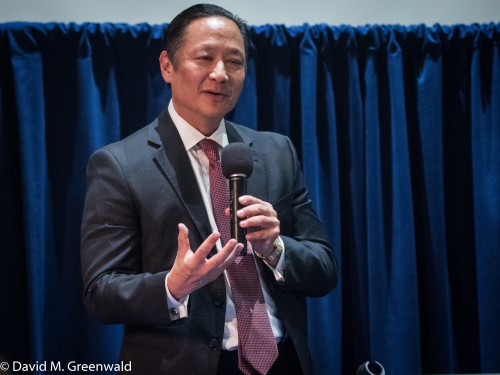

By Jeff Adachi, Niloufar Khonsari, Ana Herrera and Laura Sanchez
President-elect Donald Trump’s plan to deport millions of immigrants is an attack on thousands of San Francisco families.
The most effective way to defend them? Arm them with lawyers.
Today, supervisors will consider a plan to give city residents legal representation in deportation proceedings. The benefit is clear: An immigrant with a lawyer is seven times more likely than one without an attorney to win the right to stay in the U.S., according to a study published in 2016 by the California Coalition for Universal Representation.
The current threat to immigrants is extraordinary. Trump has vowed to deport millions, build a wall along the U.S.-Mexico border and ban immigrants from countries with histories of terrorism. This plan will likely include expanding raids by federal immigration authorities.
If even a portion of Trump’s plans come to fruition, it will increase the number of people who need help exponentially. Over the past year, there were 1,500 immigrants who were detained during deportation proceedings in San Francisco. Currently, immigrants facing deportation have no right to court-appointed legal representation, even though they are deprived of liberty and face lifetime separation from their families or being returned to countries where they may face persecution, torture and even death.
The statistics are stark. Nearly 70 percent of immigrant detainees are unrepresented by lawyers. More than half lived in San Francisco for more than a decade, and 65 percent were employed.
San Francisco’s new plan has a successful blueprint. In 2013, New York City pioneered a public immigration defender program for people facing detention and deportation. In its first three years, New York provided nearly 2,000 people with immigration attorneys, and the program reduced the number of annual deportations from 1,200 a year to 500. New Jersey started a similar program in 2015 and experienced similar results.
Since the Gold Rush, San Francisco has provided refuge for newcomers. When San Francisco first implemented sanctuary policy in 1989, The City was one of the first to embrace what was then a radical idea to protect its immigrant population. Today, our city is home to 100,000 noncitizens and more than 44,000 undocumented immigrants. It’s time to expand our sanctuary policies.
A collaboration of elected officials, nonprofit organizations, foundations and the Public Defender’s Office is proposing that The City fund attorneys to provide this essential representation to immigrants facing deportation. Funding will also be used to create essential services that include a multilingual legal advice line, know-your-rights training, education and outreach to immigrant communities and the expansion of a rapid response network to provide support to families facing detentions and removal proceedings.
This city-community collaboration has proven successful. In 2014, The City funded the San Francisco Immigrant Legal Defense Collaborative, comprised of 13 legal service providers who have provided representation to more than 500 unaccompanied children. SFILDC has won relief for every family it has represented.
It is essential that we prioritize this basic, due-process protection for San Franciscans facing deportation. Not only do they lose when they are deported, San Francisco loses as well.
Jeff Adachi is the San Francisco Public Defender. Niloufar Khonsari is the executive director of Pangea Legal Services. Ana Herrera is the managing immigration attorney with Dolores Street Community Services. Laura Sanchez is the director of CARACEN Immigration Legal Program.
So you have a lawyer advocating for the public to pay for more lawyers. Have you considered asking an orthodontist if the taxpayers should pay for orthodontics for all immigrants?
It’s not exactly the same thing – is it? An orthodontist gets paid by the client, a public defender gets a salary and gets the same salary regardless of case load.
It’s still job security and empire building. Have you noted all the unemployed attorneys lately? It would be like the TSA for lawyers.